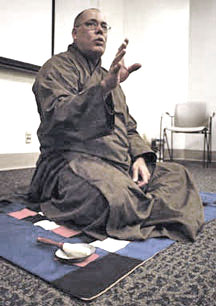___UCLA
Students Resurrect Campus Buddhism___
Group
meditates, watches films, hears guest lecturers to understand
human suffering
 |
|
DENNIS
GARCIA/Daily Bruin
|
| Reverend
Kusala, a Buddhist monk and UCLA chaplain, leads meditation
in Ackerman. |
|
By
Peijean Tsai
DAILY BRUIN CONTRIBUTOR
ptsai@media.ucla.edu
UCLA
BRUIN 1-15-2003
Raised by a Vietnamese Buddhist mother, Amie McCampbell never
felt alienated from Buddhism. An altar with the Buddha's
likeness permanently sat in her parents' home, she attended
pagodas and wore a necklace with a tiny gold Buddha for years
during high school.
But the necklace never carried much significance for her, until
she came to UCLA just over a year ago and became interested
in the 2,500-year-old philosophy.
"I wore (the necklace), but I didn't know what it
was about," McCampbell said, adding that she had previously
associated the small sculpture with her heritage rather than
religion.
As a relatively new follower of Buddhism, McCampbell, a second-year
undeclared student, is a typical member of the University
Buddhist Association, a relatively new student organization
started last fall after a three-year absence of Buddhist groups
at UCLA.
Yet Rosa Langley, the club's social chair and meditation
coordinator, who has been practicing Buddhist meditation since
age 13, is also a typical member of the group.
"Some of us are very experienced meditators; some have
only just begun to meditate," said Aaron Lee, UBA president
and a second-year linguistics student, describing the organization's
varying range of followers.
So far, regular attendance boasts about a dozen members, with
a mailing list of 40 and growing.
The students of the organization meet regularly for lectures
on Buddhist philosophy, history and application to daily life,
as well as for group meditation.
They spend their Monday evenings in silence, sitting still for
intervals of 25 minutes, led by Reverend Kusala, the Buddhist
Chaplain for the University
Religious Conference at UCLA and the Association's
director. Kusala, an American-born Bhikshu, or monk ordained
in the Zen tradition of Vietnam, defines his beliefs behind
the Theravada Buddhist doctrine.
Forming a circle with each person resting atop a "zafu"
cushion, quiet ensues, eyelids drop, and Rev. Kusala gently
strikes the gong three times so that meditation can officially
begin.
Sitting still in meditation is just one of the methods members
employ to understand human suffering, Buddhism's basic
focus. By ceasing all action temporarily, they deny any distracting
pleasures to their five physical senses, and to the mind, what
Buddhists label as the sixth sense, and according to Kusala,
is the "hardest one to control."
In addition to regular meditation, the Association also gathers
to hear guest lecturers which include Bhante Walpola Piyananda,
the first Sri Lankan monk on the West Coast and the first Buddhist
chaplain for UCLA, according to the organization's Web
site. The group's next event includes film screenings tomorrow
night on meditation programs that helped inmates at a minimum
correctional facility near Seattle, Wa. as well as one at Tihar,
the largest prison in India.
For students in the organization, the group offers a unique
experience where they can pursue their beliefs and practice
Buddhist techniques.
"Out of all religious traditions, (Buddhism) is the one
I resonate the most with," said Langley, a first-year world
arts and cultures student, who added that her non-religious
parents had no religious influence on her.
What attracted McCampbell – who serves as UBA secretary – to
Buddhism is that its teachings can help people deal with problems
they are having at any point in their lives, no matter what
age, she said.
The purpose of resurrecting the Buddhist group on campus was
to make Buddhism accessible to UCLA, a path previously unavailable
after the UCLA Buddhist Club's activities died off three
years ago.
"There is a need to be filled," Lee said, citing that
Christian, Jewish and Muslim groups dominate the campus religious
sphere.
Lee said he worries that in the absence of Buddhist organizations
on campus, some might not be able to develop their beliefs in
Buddhism at all.
"(The UBA) gives students a chance to explore Buddhism.
If they explore it and don't like it, that's fine.
But I feel bad if they don't even get the chance to find
out what it's about," Lee added.
Buddhism tends to appeal particularly to college students because
the nature of Buddhism is to question rather than accept simplistic
maxims or rely on a divine authority, said William Chu, a Buddhist
studies doctoral student who occasionally leads group talks.
A number of beliefs and practices set Buddhism apart from other
religious traditions. Buddhist techniques and mantras all surround
the basic idea of achieving spiritual enlightenment by ending
suffering with personal discipline, ethics, mental purification
and wisdom.
Followers learn about the faith through the teachings of the
Buddha known as the Dharma, monks and nuns who have committed
themselves to the faith through formal ordination and who have
accepted the five precepts of Buddhism – not to kill, steal,
engage in sexual misconduct, lie about spiritual attainment
and consume intoxicants.
While he has been practicing Buddhist techniques for decades,
Rev. Kusala emphasizes that it is not a matter of which religion
is the correct path, but rather that people choose a single
religion for themselves and then stay with it.
|